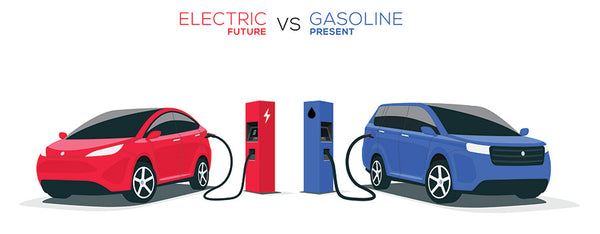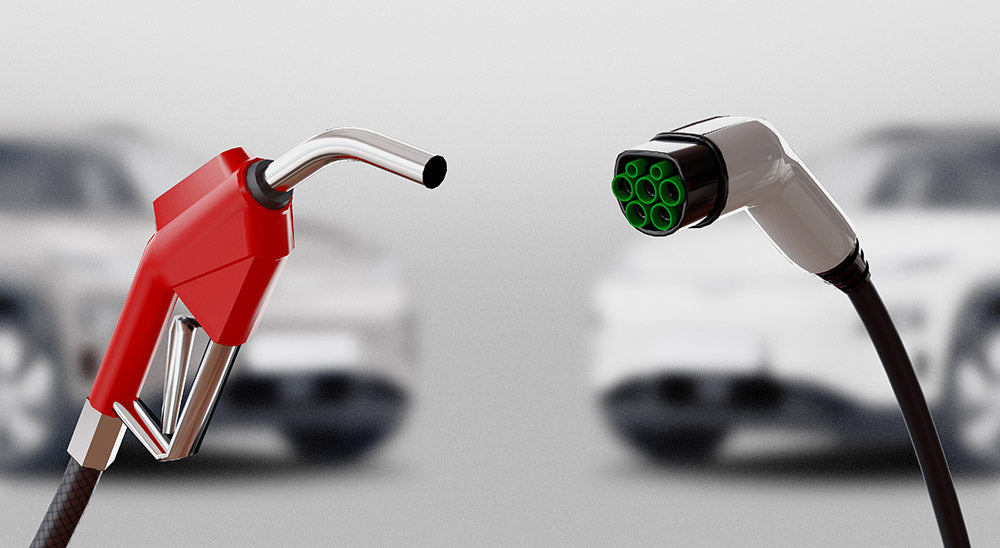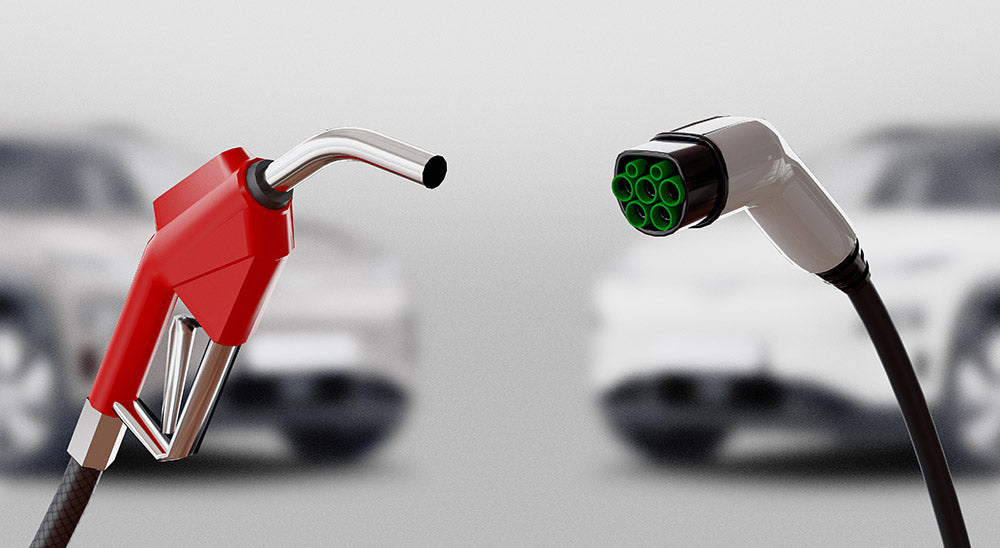EV's vs. Gas Cars: Does an Electric Vehicle Actually Cost Less to Drive
It's no secret that electric cars save energy and are a step in the right direction toward reducing our carbon footprint. Since the Toyota Prius was first rolled out in 1997, EVs have been heralded for saving the climate, all while being more convenient and less costly to their drivers. As gas prices rise over 58% compared to this time last year, the temptation to trade in your gas guzzler for an electric or hybrid alternative is higher than ever. But, are EVs really less expensive in the long run?
Over any car's lifetime, there are many more factors to consider than just the cost of fuel or electricity, from the initial sticker price to maintenance and everything in between. So, before you buy or trade, we've got you covered with a full cost breakdown of owning a gas vehicle as compared to an electric car.
Gas Cars vs. Electric Cars: Purchase Price
A new electric car comes with a higher sticker price than a new gas-powered car. In 2021, the cost to buy a new EV averaged around $10,000 higher than the industry average (which combines gas vehicles and battery-powered vehicles). In 2022, the most affordable gas car on the market will cost around $15,000 to buy new. The lowest price you can expect to pay for a new electric vehicle? Nearly double that. In fact, according to Kelly Blue Book, the average price for an electric vehicle in 2021 was over $50,000 - a high price to pay in today's economy.
It's unsurprising that this sticker shock has scared off many people initially set on going electric. However, as the market for electric vehicles continues to rapidly grow and car manufacturers place greater importance on having affordable electric or hybrid models in their lineup, the initial cost of electric cars is expected to decrease.
Why so expensive?
The cost of the battery and the technology surrounding a battery-powered car is still relatively new to the market, and therefore drives up market price. And, where you can purchase a gas car and drive it off the lot without worrying about where you can fill it up when the tank is low, with an EV, you need a charging system, and may also need to plan for an upgrade to the standard EV charging system, which can typically only take you about 8 hours. If you're planning on your EV being your daily or long-distance driver, increasing voltage is another expense to consider.
Some good news though: Many states offer tax incentives for owning an electric vehicle, which will help mitigate initial purchase costs.
Gas Cars vs. EVs: Maintenance Costs
Any car you opt for will come with basic maintenance, but gas cars have significantly more standard maintenance requirements than electric vehicles do. Without oil changes and other regular maintenance needs that gas cars require, an electric vehicle could reasonably pay for itself in a few years of less regular repair and upkeep. According to Consumer Reports, on average, electric vehicles cost only half of what it costs to maintain a gas car.

Gas Prices vs. Electricity Prices
Here's where the major draw for owning an electric vehicle comes into play. Making the switch from gas to electric means avoiding the uncertainty and rising expense of needing to regularly fill up at the gas station. The same Consumer Reports study from above found that drivers of electric vehicles spend on average about 60% less than drivers of gas cars. Pretty compelling savings.
Of course, your individual spend on gas or electricity will vary depending on your car's model and size, so it can be difficult to estimate savings calculations. While most drivers have a decent understanding of a good vs. bad gas mileage, it's still not widely understood how EVs measure energy efficiency and what that can mean for your wallet.
Let's break it down some: Electric vehicles measure efficiency by kilowatt-hours (kWh) of electricity per 100 miles. This is the standard metric to consider and compare when shopping for EVs. The most energy efficient EV model on the market currently is the 2022 Tesla Model 3 RWD, which will run you somewhere between $45,000 - $55,000 all said and done.
Gas prizes are a major buzz topic right now, but it's worth noting that charging your electric vehicle at home will also spike your electricity bill. Measuring how much exactly is difficult and depends on how frequently you charge your car from your home and where in the world you live. (Electricity costs vary by region in the same way that gas prices do.) Charging in public is an option too, of course, but the cost to charge at a public station is likely to be more expensive than charging at home.
When, where, and how often you charge your EV will all significantly affect the overall lifetime cost of your vehicle.
Regardless, even with this major factor under consideration, it would take a lot of charging for an electric vehicle's power to cost as much as a gas vehicle's. Research from AAA found that electric car owners who drive approximately 15,000 miles spend roughly $546 to power their vehicle. Gas-powered car owners who drive the same amount of miles in a year spend around $1,255.
Cost Over Lifetime: Which is the Better Choice?
All things considered, over the lifetime of a vehicle, an electric car will still cost less, despite the initial upfront costs. The reality is that, while going green is still a scary concept to many drivers due to expensive sticker prices, questions of accessibility to charging stations and other factors, owning an electric car will likely be cheaper in the long haul. In combination with the knowledge that you'll be taking a step toward saving the environment, buying an electric vehicle seems to be an economically sound choice.
And current electric vehicle owners agree. According to AAA, a survey of EV owners found that 96% reported they would buy or lease anther electric vehicle the next time they were ready to buy a new car. With stats like that, it seems electric cars are not just a futuristic trend, but money-smart option worth considering today.
No matter what kind of car you drive, Partsmax has your back.
Got savings on your mind? Partsmax can help you save big on aftermarket auto parts. Browse our site and buy online, or, if you're in South Florida, pay our retail store a visit. Our parts experts are ready to help you save big.


